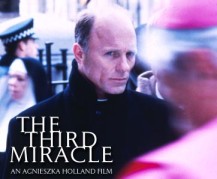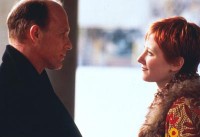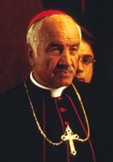|
The Third
Miracle
|
| |
 |
USA,
1999. Rated R. 119 minutes.
Cast: Ed Harris, Anne Heche, Armin
Mueller-Stahl, Michael Rispoli, Caterina Scorsone, Barbara Sukowa, Charles
Haid, James Gallander, Jean-Louis Roux, Ken James
Writers: John Romano and Richard Vetere from the novel by Richard
Vetere
Music: Jan A.P. Kaczmarek
Cinematographer: Jerzy Zielinski
Producers: Fred Fuchs, Steven Haft
Director: Agnieszka Holland
|
| Grade:
C |
Review
by Jeff Vorndam |
 his year
has brought forth a bumper crop of Catholic-themed movies. First was the inane
Stigmata, a ludicrously sensational thriller whose religious aspects
were played for shock value. A month later, Kevin Smith's bawdy opus Dogma
splashed across the screens, provoking equal parts thought and embarrassment.
Then we were blessed with Neil Jordan's sublime The
End of the Affair, a handsome and reflective treatment of Grahame Greene's
classic novel about our moral obligations to God. The trinity wouldn't be complete
without a fourth member (it also wouldn't be trinity, but work with me here),
and arriving in theaters is Agnieszka Holland's mystery/drama The Third Miracle.
The question at this point is: should you care? The Third Miracle is
a movie about a priest's crisis of faith, his temptations of the flesh, and
the nature and need of miracles themselves. The first is standard movie stuff
- priests in movies are either soul-searching doubters or intolerant Bible-thumpers.
The second is unconvincing and unnecessary - the romance subplot adds nothing
to film other than to make us squirm at its awkwardness. The third aspect of
the film is intriguing however, and had it been better developed and presented,
The Third Miracle could be seen as a success despite its other flaws.
It's overshadowed by those flaws though, and bogged down in the last act by
what is essentially a courtroom climax, as tired a movie device as they come.
his year
has brought forth a bumper crop of Catholic-themed movies. First was the inane
Stigmata, a ludicrously sensational thriller whose religious aspects
were played for shock value. A month later, Kevin Smith's bawdy opus Dogma
splashed across the screens, provoking equal parts thought and embarrassment.
Then we were blessed with Neil Jordan's sublime The
End of the Affair, a handsome and reflective treatment of Grahame Greene's
classic novel about our moral obligations to God. The trinity wouldn't be complete
without a fourth member (it also wouldn't be trinity, but work with me here),
and arriving in theaters is Agnieszka Holland's mystery/drama The Third Miracle.
The question at this point is: should you care? The Third Miracle is
a movie about a priest's crisis of faith, his temptations of the flesh, and
the nature and need of miracles themselves. The first is standard movie stuff
- priests in movies are either soul-searching doubters or intolerant Bible-thumpers.
The second is unconvincing and unnecessary - the romance subplot adds nothing
to film other than to make us squirm at its awkwardness. The third aspect of
the film is intriguing however, and had it been better developed and presented,
The Third Miracle could be seen as a success despite its other flaws.
It's overshadowed by those flaws though, and bogged down in the last act by
what is essentially a courtroom climax, as tired a movie device as they come.

I think Catholicism fascinates filmmakers because it recognizes and codifies
the supernatural. The mundane and ordinary acts of worship are embellished with
(in the eyes of storytellers) tales of miracles and exorcisms, saints and demons,
forgiveness and wrath. According to Catholic doctrine, in order to be canonized
(made a saint), the worthy candidate must have not only led an exemplary life
of service to God, but also have been demonstrably responsible for two miracles.
According to the Church, a miracle can only occur after the person has died
--their intercession in response to prayer is what constitutes the miracle.
The movie, which intends to be a serious examination of the nature of miracles
makes a serious error by attributing one of the miracles in this film to a person
while she is still living. (For more on how to become a saint, click
here! ) Another gaffe is that the film takes place in 1979, four years before
Pope John Paul II lowered the requirement for miracles from three to two (don't
get your hopes up, kiddos).
In a rare leading role, Ed Harris plays Father Frank Shore, the sexiest priest
in Chicago. He is introduced to us as a disillusioned flunkey, abandoning his
practice to live amongst the poor. Father Shore once specialized in investigating
(and debunking) miracles for the Church. He became disgruntled when his efforts
to expose a reputed miracle as a fraud resulted in an entire community's loss
of faith. On the one hand, the Church has to check the veracity of the legion
of claims of miracles it receives. On the other hand, as Father Shore reckons,
if the belief in a miracle enables faith in the people, isn't its value apparent?
The contingency upon miracles for faith causes Shore to doubt his own beliefs,
as he has never met a miracle he couldn't unshroud. This particular case involves
an immigrant woman named Helen (Barbara Sukowa), who is alleged to have cured
a young girl (Caterina Scorsone) of lupus when the girl prayed to her. Because
this is a movie, Agnieszka Holland can't resist adding a statue that cries tears
of blood when it rains, though this is not treated as a separate miracle in
the film, but as more of a freaky side effect--further proof that something
extraordinary is happening. 
Father Shore, in the course of his investigation, must find people who
will attest to Helen's goodness while on Earth, like character witnesses
at a trial. An important person who will be needed to vouch for Helen is
her daughter Roxanne (Anne Heche). Perhaps it's because everyone else in
the movie is so dull and serious, but Heche's Roxanne leaps off the screen
with feisty spunk. She wears bizarre headdresses. She talks in excited
halting sentences. She's not above seducing a priest and (literally) dancing
on her mother's grave with him and a bottle of vodka (one of the silliest
scenes I've witnessed all year). She's also a non-believer. Ironically,
it is her disbelief and the sexual attraction Father Shore feels toward
her that reawaken his spiritual side. Roxanne is bitter about Helen abandoning
her at age 16 to devote herself to God. Shore has come around to defending
Helen, and needs Roxanne to consider whether Helen found the decision to
leave her tortuous, so the Church's saint review board doesn't disallow
her for neglecting her child. Here the movie surprised me by doing the
right thing. Roxanne and Frank's budding romance is nipped by this difference
of opinion. She can't believe her mother could be a saint after leaving
her, and he needs Helen to be a saint to restore his faith.
It all comes down to a showdown in the inner sanctum of Church politics.
Father Shore presents the case for beatification. Opposing him is a bigwig
flown in from the Country of Scary Accents, Cardinal Werner (Armin Mueller-Stahl,
in fine loathsome form). By removing the story to the realm of polemic
and pontification, the film loses the thread it had tying miracles to faith.
There are shocks and surprises during the proceedings: a couple of unexpected
visitors, last-minute pleas, and personal revelations, all of which are
clearly foreseeable or tried-and-true movie clichés. The coda attempts
to instill a sense of wonder as we leave the film, but you may be wondering
by this point just how many miracles does the film believe it presents
- 2? 3? 4? If it were more clear that the movie is going beyond the limiting
Catholic definition of a miracle, and pointing us toward miracles that
occur in our everyday lives, then the ending would fit. It doesn't appear
that the Church's view has been discarded though, and the last episode/miracle
feels tacked on, almost like a joke on its bearer.
The Third Miracle did not involve me as entertainment, or explore its
themes as well as it could have, but there is interesting material for those
who are dedicated to finding it. Ed Harris, whose last bad performance was during
the Carter administration, is convincing and charismatic. The photography is
appropriately matched to the story. Ranging from grainy realism [tangent: why
is grainy associated with realism? We live in a real world, but I don't look
outside and see grainy particles floating around] to overexposed hyperreality,
it captures the mood and environment appropriately. If, by some miracle, this
film appears at a multiplex near you, consider it as an alternative once you've
seen all the other films canonized by my fellow AboutFilm critics.
Review
© February 2000 by AboutFilm.Com and the author.
Images © 1999
Sony Pictures Classics. All Rights Reserved.



